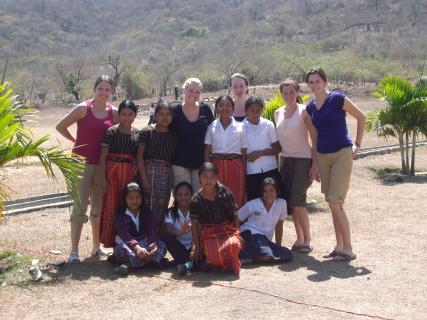
Service Learning is a community-based program that links academic course work with community service work. Students can work together with local, national, and international community organizations as part of their course assignments and practice Spanish. They contribute to these organizations by sharing their skills and knowledge acquired at the university, approach learning in fresh ways, and explore relationships between their academic training and real-life applications.
There are two streams of service learning that students can take part in:
- Course-Based Service Learning in Spanish entails working with Spanish-speaking communities in Antigonish, in Nova Scotia, and in Canada or sharing knowledge about the Hispanic world with the local community.
- Immersion Service Learning requires students to travel to a Latin American country for a week and work with local organizations on the ground.
Course-Based Service Learning

Course-Based Service Learning is an opportunity to try your academic skills outside of the classroom and to share your knowledge with the community. The Service Learning component in Spanish classes consist in creating projects for local, regional, or national non-profit organizations.
What will you be doing?
In the process, you may be required to:
- Communicate with Spanish speakers
- Develop presentations about the Hispanic world, and/or
- Teach Spanish
Students enrolled with Course-Based Service Learning Spanish courses created, for example, children's books for the People’s Place: Antigonish Public Library and mini documentaries for ACALA: Antigonish County Adult Learning Association.
All SPAN 101/102 and SPAN 221/222 courses taught by Dr. Wojciech Tokarz have a Service Learning component.
Immersion Service Learning

Students who are part of Immersion Service Learning program can travel to Mexico, Guatemala, or Cuba during the Winter Recess period in February. They travel with a faculty leader and work with local organizations.
What will you be doing?
This program is an outstanding opportunity for students studying Spanish to:
- Be introduced to Latin American culture
- Improve their communicative intercultural competence, and/or
- Learn about issues related to culture, social justice, education, sustainability, and human rights
Thanks to a long-lasting collaboration with our community partners, you will be able to access a world that usually remains hidden to outsiders and gain a unique perspective on Latin America.
Prerequisites
Only SPAN 101/102 and SPAN 221/222 courses taught by Dr. Wojciech Tokarz have an optional Immersion Service Learning component.
The Service Learning assignments in SPAN 101/102 and/or SPAN 221/222 courses will prepare you for your community service in Mexico, Guatemala or Cuba.
Course Requirements
Upon your return to Canada you will be expected to share your reflections about your experience with the rest of the class through several written projects and oral presentations. All the assignments related to Immersion Service Learning meet the teaching objectives of SPAN 101/102 and SPAN 221/222.
Contact
207 Immaculata Hall
2360 Notre Dame Avenue
Antigonish NS B2G 2W5
Canada

